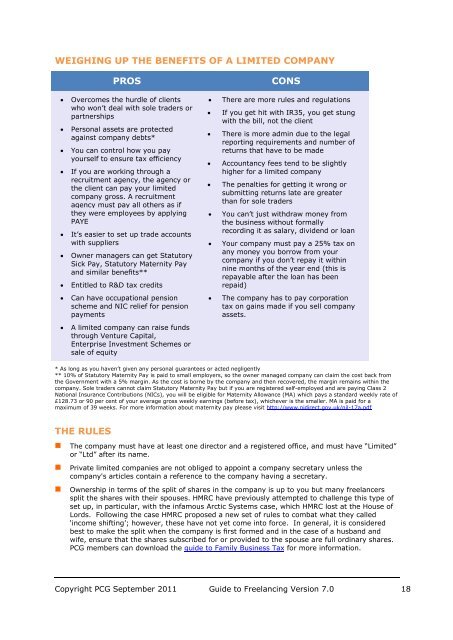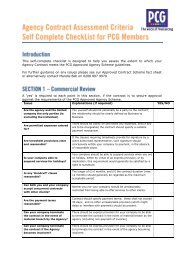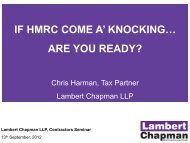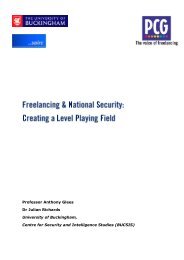Guide to Freelancing - PCG
Guide to Freelancing - PCG
Guide to Freelancing - PCG
You also want an ePaper? Increase the reach of your titles
YUMPU automatically turns print PDFs into web optimized ePapers that Google loves.
WEIGHING UP THE BENEFITS OF A LIMITED COMPANY<br />
PROS<br />
CONS<br />
<br />
<br />
<br />
<br />
<br />
<br />
<br />
Overcomes the hurdle of clients<br />
who won‟t deal with sole traders or<br />
partnerships<br />
Personal assets are protected<br />
against company debts*<br />
You can control how you pay<br />
yourself <strong>to</strong> ensure tax efficiency<br />
If you are working through a<br />
recruitment agency, the agency or<br />
the client can pay your limited<br />
company gross. A recruitment<br />
agency must pay all others as if<br />
they were employees by applying<br />
PAYE<br />
It‟s easier <strong>to</strong> set up trade accounts<br />
with suppliers<br />
Owner managers can get Statu<strong>to</strong>ry<br />
Sick Pay, Statu<strong>to</strong>ry Maternity Pay<br />
and similar benefits**<br />
Entitled <strong>to</strong> R&D tax credits<br />
<br />
<br />
<br />
<br />
<br />
<br />
<br />
There are more rules and regulations<br />
If you get hit with IR35, you get stung<br />
with the bill, not the client<br />
There is more admin due <strong>to</strong> the legal<br />
reporting requirements and number of<br />
returns that have <strong>to</strong> be made<br />
Accountancy fees tend <strong>to</strong> be slightly<br />
higher for a limited company<br />
The penalties for getting it wrong or<br />
submitting returns late are greater<br />
than for sole traders<br />
You can‟t just withdraw money from<br />
the business without formally<br />
recording it as salary, dividend or loan<br />
Your company must pay a 25% tax on<br />
any money you borrow from your<br />
company if you don‟t repay it within<br />
nine months of the year end (this is<br />
repayable after the loan has been<br />
repaid)<br />
<br />
Can have occupational pension<br />
scheme and NIC relief for pension<br />
payments<br />
<br />
The company has <strong>to</strong> pay corporation<br />
tax on gains made if you sell company<br />
assets.<br />
<br />
A limited company can raise funds<br />
through Venture Capital,<br />
Enterprise Investment Schemes or<br />
sale of equity<br />
* As long as you haven‟t given any personal guarantees or acted negligently<br />
** 10% of Statu<strong>to</strong>ry Maternity Pay is paid <strong>to</strong> small employers, so the owner managed company can claim the cost back from<br />
the Government with a 5% margin. As the cost is borne by the company and then recovered, the margin remains within the<br />
company. Sole traders cannot claim Statu<strong>to</strong>ry Maternity Pay but if you are registered self-employed and are paying Class 2<br />
National Insurance Contributions (NICs), you will be eligible for Maternity Allowance (MA) which pays a standard weekly rate of<br />
£128.73 or 90 per cent of your average gross weekly earnings (before tax), whichever is the smaller. MA is paid for a<br />
maximum of 39 weeks. For more information about maternity pay please visit http://www.nidirect.gov.uk/nil-17a.pdf<br />
THE RULES<br />
• The company must have at least one direc<strong>to</strong>r and a registered office, and must have “Limited”<br />
or “Ltd” after its name.<br />
• Private limited companies are not obliged <strong>to</strong> appoint a company secretary unless the<br />
company's articles contain a reference <strong>to</strong> the company having a secretary.<br />
• Ownership in terms of the split of shares in the company is up <strong>to</strong> you but many freelancers<br />
split the shares with their spouses. HMRC have previously attempted <strong>to</strong> challenge this type of<br />
set up, in particular, with the infamous Arctic Systems case, which HMRC lost at the House of<br />
Lords. Following the case HMRC proposed a new set of rules <strong>to</strong> combat what they called<br />
„income shifting‟; however, these have not yet come in<strong>to</strong> force. In general, it is considered<br />
best <strong>to</strong> make the split when the company is first formed and in the case of a husband and<br />
wife, ensure that the shares subscribed for or provided <strong>to</strong> the spouse are full ordinary shares.<br />
<strong>PCG</strong> members can download the guide <strong>to</strong> Family Business Tax for more information.<br />
Copyright <strong>PCG</strong> September 2011 <strong>Guide</strong> <strong>to</strong> <strong>Freelancing</strong> Version 7.0 18








